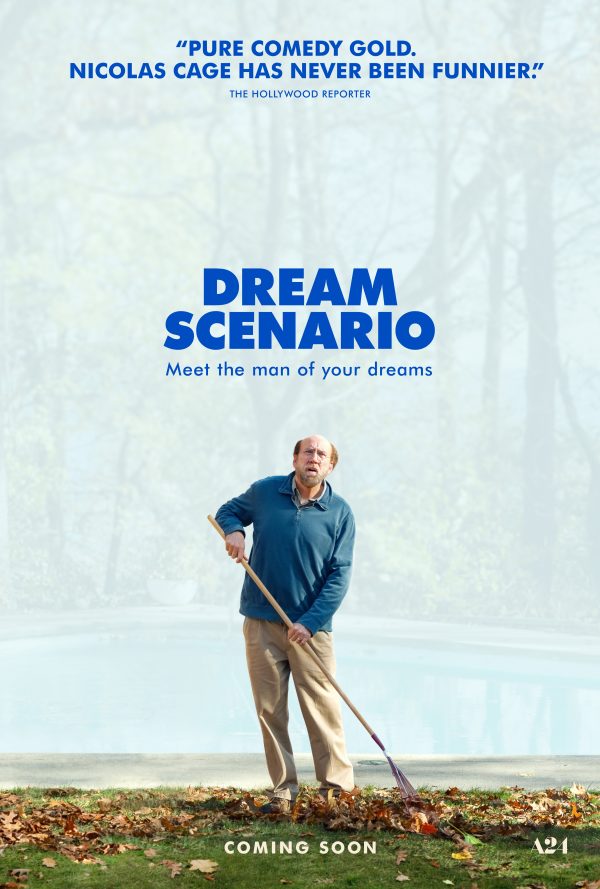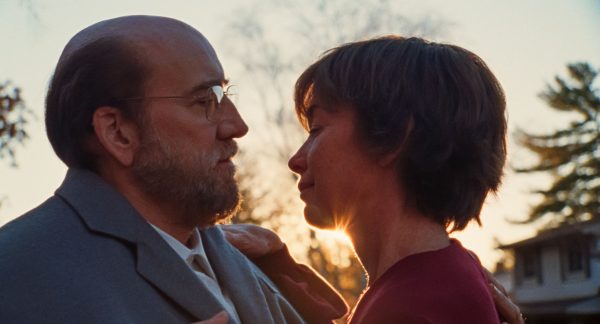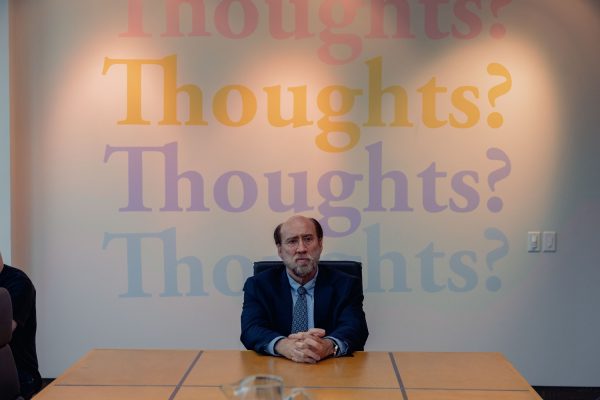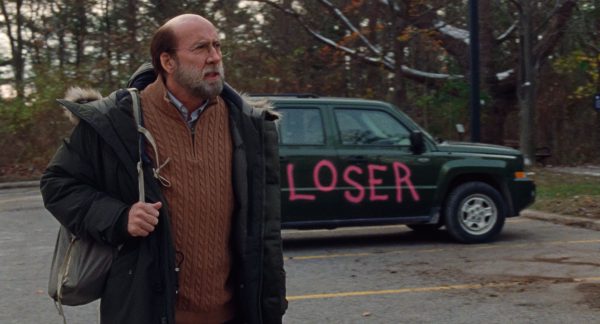‘Dream Scenario’ wrestles with social fanaticism

“Dream Scenario” (2023). Cast: Nicolas Cage, Julianne Nicholson, Lily Bird, Jessica Clement, Michael Cera, Tim Meadows, Paula Boudreau, Dylan Baker, Krista Bridges, Dylan Gelula, Kate Berlant, Marnie McPhail Diamond, Cara Volchoff, Joshua Richards, Jordan Raf. Director: Kristoffer Borgli. Screenplay: Kristoffer Borgli. Web site. Trailer.
Needless to say, Paul is completely baffled by these developments. “Why Me?”, he wonders. He’s not exactly a highly visible public person, content to be living out his life in relative solitude. It’s true that he’d like a little more notoriety for his research work, but it’s not something he obsesses about by any means, though he sometimes gets perturbed that his ex-wife, Sheila (Paula Boudreau), shows him up and steals his thunder. Nevertheless, he’s modestly excited by the prospect of being onboarded by a cutting-edge brand development company, Thoughts?, founded by an empty-headed young social media influencer and marketing whiz kid, Trent (Michael Cera), backed by his two trusty associates, Molly (Dylan Gelula) and Mary (Kate Berlant).
Paul is hopeful that the Thoughts? crew can help him get his admittedly esoteric research findings published in a book, but he’s quickly disappointed when he discovers that Trent, Molly and Mary don’t understand the first thing about what he’s seeking to accomplish. Instead of trying to help Paul realize his dreams, they work on trying to convince him to become the new spokesperson for Sprite, featuring him in commercials mirroring the appearances he makes in other people’s dreams. It’s another development that puzzles him – and one that proves disappointing when it doesn’t lead to the fulfillment of his aspirations.

The unexpected developments don’t stop there, though. After a prolonged period of what has been basically a series of benign appearances in the dreams of others, they suddenly begin moving in a new direction, taking a decidedly violent turn. The onetime-observer now becomes an active participant in the dreams, frequently engaging in grotesque and gruesome acts toward the dreamers. What’s that all about?
Paul is again mystified by what happens. As with his initial appearances in others’ dreams, he didn’t initiate or ask for this, either. This time, however, the reactions to his intrusions are different. People are scared of what’s unfolding in their dreams. His students turn against him, engaging in acts of defiant solidarity of what he represents, an initiative that not only affects their reactions to his presence in their dreams, but also in their everyday lives, including refusals to participate in his classroom instruction. It strains his relationship with the university’s dean and his longtime friend, Brett (Tim Meadows), who tries to be understanding and helpful but has his own career and future to think of in his management of these new guilt by association concerns. What’s more, prospects with Thoughts? quickly dry up, and Paul’s home life becomes rocky at best. Suddenly he’s the object of an orchestrated cancel culture campaign, one that increasingly frustrates him, especially since he never asked for any of this and is fundamentally incapable of controlling how any of it plays out.
In relatively short order, Paul goes from being a happily contented family man to someone whose life is falling apart on all fronts. The degree of frustration is maddening as he sees his life being torn apart. And the worst part of it is that he didn’t see any of it coming. But, then, as any victim of cancel culture can attest, he’s not alone on this by any means. Moreover, the effects are so pervasive that he’s unable to figure a way out of this. Indeed, what is he to do?

Considering the volatile fallout that Paul must contend with, one might legitimately observe that no one should have to be subjected to such abuse. And that insight is indeed spot on. Yet why did it happen? What’s more, why does it repeatedly continue to happen in real life? Do those inflicting such scorn not care? Have they lost their perspective? Are they so anxious for retribution that they’ll pursue any avenue to attain it, no matter how trivial or unforeseen the infraction might be? Are they willingly buying into herd mentality without thinking or taking the time to examine and assess the consequences of their actions? Or is it some of all of the foregoing?
Regardless of the cause(s) involved in this, what’s most important to recognize is what its instigators believe, for our beliefs play a key role in what manifests in our existence, a product of the conscious creation process, the philosophy driving such materializations. It’s unclear how many of us are aware of or have bought into this school of thought, but, based on what unfolds in this picture, it’s obvious that there are a good many of us who don’t have a clue about it, especially when it comes to what they’ve created.
There are several inherent problems in this. To begin with, by being unaware of the power of our thoughts, beliefs and intents, we may well end up manifesting outcomes over which we have no awareness, even though their impact is clearly undeniable. This is known as un-conscious creation or creation by default, a practice in which we’re so focused on the result that we give no consideration to the implications involved, including unintended side effects. One need only look at what comes from the initiatives of Paul’s students to see that.
Second, un-conscious creation often carries with it a huge degree of irresponsibility. Recognizing that is crucial in light of the fact that we’re the masters of our own creations, no matter how much awareness we may have of this. The fates that befall Paul – from all sources – are a direct result of what others manifest, only he’s the one left to pick up the pieces from these circumstances. (So much for our sense of personal responsibility.)

Third, the materializations Paul’s left to endure come about as a result of the joint efforts of others, a co-creation, as it were. One of the qualities that characterize such collaborations is that they’re infused with the collective power of the beliefs of all of their creators. This amplifies the impact – often significantly – when a vast number of participants are involved in these scenarios. And, in this case, they overwhelm Paul, not just because of the number of those involved, but also because of the degree of passion infused in their manifesting beliefs. They have tremendous faith in their efforts, truly convinced that they’re doing the right thing for themselves and others like them.
Of course, one might argue, doesn’t Paul play a part in this scenario? If indeed we each create our own existence, aren’t his beliefs involved in how matters unfold here? To an extent, that’s true, but what could he possibly stand to gain from getting caught up in such a toxic situation as this? There could be a variety of answers, and his reasons (and resulting beliefs) are genuinely his own business. But, if we were to speculate about possible intents, perhaps it’s because he’s volunteered to step up to the plate and show others what kind of impact their beliefs and actions might have on someone in a scenario like this. He might like to hope that the personal sacrifice he unwittingly makes can help the others see the errors of their ways, giving them food for thought to consider in whatever they undertake in future ventures. That could be a lot to hope for in light of their intransigent way of thinking, of course, but, then, someone has to get the ball rolling when it comes to something like this. And, given Paul’s intrinsic thoughtfulness and sensitivity, maybe he believes that he’s the one who should try to attempt it in hopes of bringing about meaningful change. What a noble gesture, to be sure.
I find it intriguing that Paul may be seeking to accomplish this by inserting himself into others’ dreams. It seems like an ideal way to “get into someone’s head.” On a metaphorical level, his insertion of himself into the dream state of others is akin to showing up in the newsfeeds of social media platforms, a somewhat comparable way of injecting oneself into the everyday lives of an array of individuals, including some we may not even know. And, like those newsfeeds, even though his initial appearance may seem somewhat benign – as evidenced by his presence primarily as an observer – once he’s established himself there, he takes on other distinguishing qualities with which others may agree or intrinsically find fault (and we all know from social media experiences what can result when that happens).

While Paul’s later dream appearances take on what seem to be violent tendencies, those actions can be interpreted metaphorically, too. For instance, if, after his period of initial observation, he discovers that the fulfillment of his adopted mission calls for him to point out the aforementioned manifestation pitfalls (lack of awareness, irresponsibility and the potentially disruptive power of joint efforts), he might well encounter strong opposition from those who resist such changes in perspective, prompting them to lash out at attempts at removing them from the comfort zones of their prevailing and established beliefs. The backlash could be considerable, depleting him of his enthusiasm and leaving him to sort matters out from a seriously weakened and vastly overwhelmed position. Martyrs, it would seem, seldom have it easy, particularly when faced with the force of an organized cancel culture campaign. His only hope under circumstances like these is that a seed gets planted for the future, one that viably takes root and successfully sprouts down the road.
For everything that “Dream Scenario” has to say about the foregoing, it has much more to impart in other areas as well, such as the nature of fame and the downfalls that can come with it. Likewise, the film addresses the nasty ongoing intergenerational feuds occurring between Baby Boomers and the combined forces of Millennials and Gen Z, a situation most notably pointed out in the confrontations between Paul and his students. These factors don’t receive quite the same level of attention as the cancel culture considerations, but they’re present nonetheless, especially since they factor into the picture’s primary insights. Collectively, they weave a troubling tapestry of contemporary society, holes and all, showing us what a precarious path we’re currently on – and what could happen if we don’t soon take out our fabric repair kits to fix things before they completely unravel.

Packing a lot of material and ideas into a single film can result in a muddled, confusing mess, no matter how well-meaning a filmmaker’s intentions might be. However, in his third feature outing, writer-director Kristoffer Borgli succeeds for the most part when it comes to tackling such an imposing task. This offbeat fable takes viewers on a wild ride through the diverse realms of fame, metaphysics, cancel culture, unrelenting group think, and unexpressed, underpursued desire, along with the downside consequences of each. The curious oneiric anomaly that sets things in motion quickly transforms the protagonist into an overnight viral media sensation, one that starts off with a generous showering of attention and lustful admiration but that almost as quickly leads him to become a scorned put-upon pariah, a scenario not unlike what can happen to anyone in the public eye in the wake of even the slightest of transgressions. From the foregoing description, it might sound like the filmmaker has tried to overstuff this vehicle with far too much material for viewers to process and comprehend, and there are points in the story (especially in the last half hour) where a good case could be made for that argument. However, in telling this allegorical tale, the director manages to keep the narrative’s ideas distinctly sorted and in context to drive home his message, a powerful cautionary tale about the point we’ve collectively reached as a society. These are notions that we all need to hear but seldom do because of all the noise surrounding us that prevents us from hearing the music because of all the notes.
For all its seriousness, however, “Dream Scenario” is loaded with absolutely hilarious, laugh-out-loud humor and fine performances all around (especially Cage and Cera), complemented with skillful film editing and carefully selected incidental shots that effectively punctuate the mood of many scenes. The script is generally solid, too, though it begins to stray somewhat from the material that works best in the final act, and there are a few graphically violent sequences that sensitive viewers should be wary of. On balance, though, this is the kind of production that should be made in greater numbers in an age where so many of us have lost touch with reason, our existence and ourselves. Maybe watching an offering like this could help us all sit up, think and get back on track while we still can. The film is playing theatrically.
So many have said that there is something fundamentally out of whack when it comes to our society – if not our entire world – these days, and it often feels like the time to fix it may be quickly slipping away from us. “Dream Scenario” shines a bright light on this sentiment, and it does so with unrelenting, in-your-face candor. It’s an urgent wakeup call for those who are currently sleeping through their lives and don’t seem to care. One can only hope that the alarm is loud enough to have its intended effect before the opportunity to have an impact is gone for good.
Copyright © 2023, by Brent Marchant. All rights reserved.



